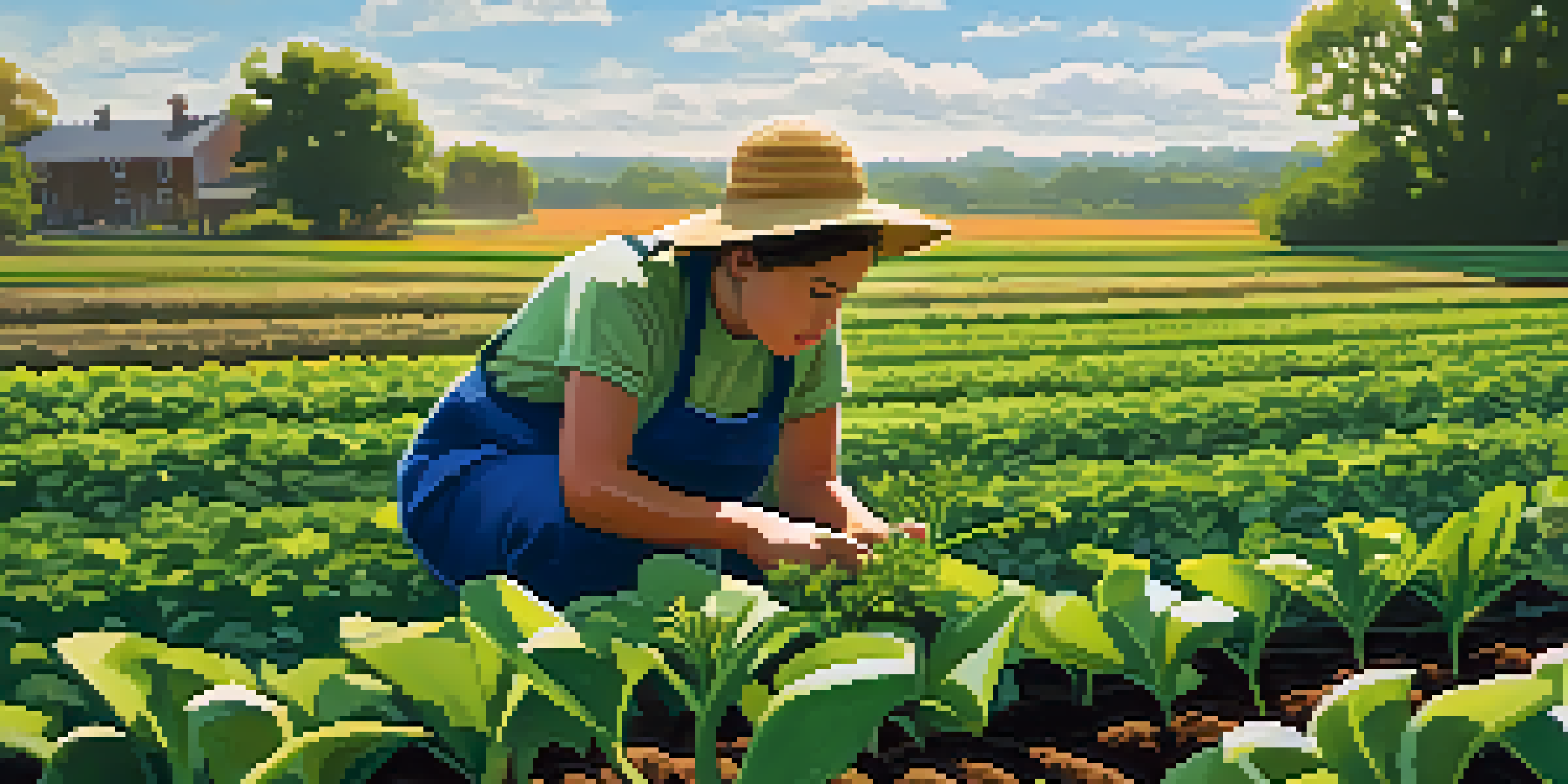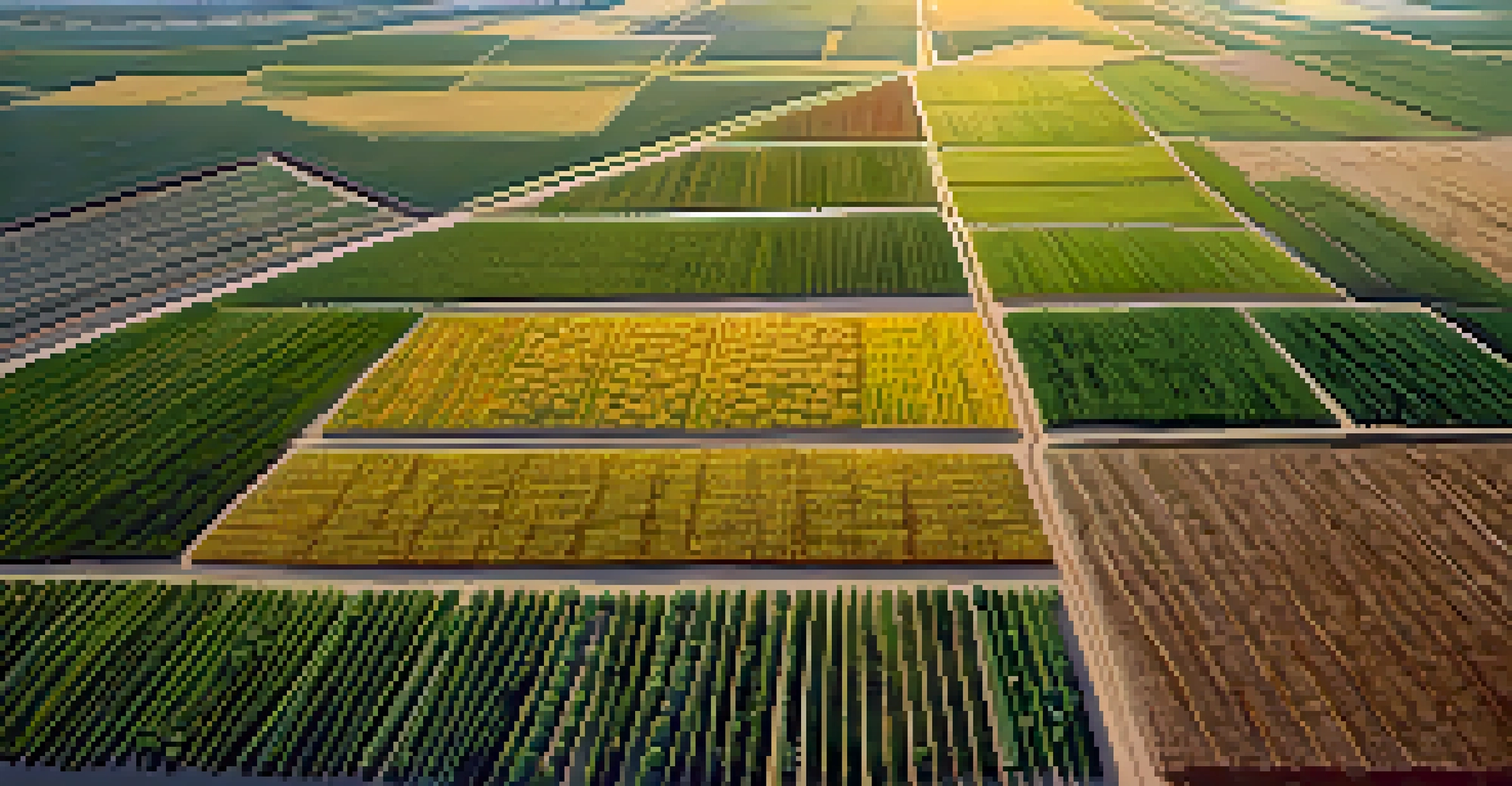Sustainable Agriculture Practices at Michigan State University

Introduction to Sustainable Agriculture at MSU
Sustainable agriculture is at the forefront of Michigan State University's mission to create a healthier planet. It encompasses practices that not only yield crops but also preserve resources for future generations. At MSU, this commitment is reflected in various on-campus initiatives and research projects that promote environmental stewardship.
Sustainable agriculture is a way of life that combines farming with environmental stewardship, ensuring that we leave a healthier planet for future generations.
The university serves as a hub for innovative agricultural education, where students learn the importance of balancing productivity with ecological health. This approach ensures that future farmers are equipped with the knowledge and skills needed to implement sustainable practices. By fostering a culture of sustainability, MSU is shaping a new generation of agricultural leaders.
As we delve deeper into the sustainable practices employed at MSU, we’ll explore how they contribute to both local and global food systems. From crop rotation to organic farming, these methods exemplify the university's dedication to sustainable agriculture.
Crop Rotation: A Key Sustainable Practice
One of the cornerstone practices of sustainable agriculture at MSU is crop rotation. This technique involves alternating the types of crops grown in a specific area from season to season, which helps maintain soil health and fertility. By preventing soil depletion, crop rotation can lead to higher yields and reduced reliance on chemical fertilizers.

MSU researchers have demonstrated that diverse cropping systems can significantly enhance biodiversity. For example, planting legumes after cereal crops not only enriches the soil with nitrogen but also reduces pest populations. This natural method minimizes the need for synthetic pesticides, aligning perfectly with sustainability goals.
MSU Champions Sustainable Agriculture
Michigan State University is dedicated to sustainable agriculture through research, education, and community engagement.
Through workshops and hands-on training, MSU educates farmers on the benefits of crop rotation, encouraging its adoption across Michigan. By sharing success stories, they inspire local farmers to embrace this practice, ultimately fostering a more resilient agricultural landscape.
Organic Farming Initiatives at MSU
Michigan State University is a leader in organic farming education and research, providing resources and support for farmers transitioning to organic methods. The university’s organic farm serves as a living laboratory where students and researchers can experiment with and learn about organic practices firsthand. This immersive experience cultivates a deep understanding of the complexities involved in organic agriculture.
The greatest threat to our planet is the belief that someone else will save it.
Organic farming emphasizes the use of natural inputs and processes, which can lead to healthier ecosystems. At MSU, students learn about soil health, pest management, and biodiversity—all essential components of successful organic farming. These principles not only contribute to environmental sustainability but also promote food safety and quality.
The popularity of organic products has surged in recent years, making this a timely focus for MSU. By equipping students with the knowledge and skills needed to thrive in the organic sector, the university is preparing them for successful careers while promoting sustainable agriculture.
Innovative Research in Sustainable Practices
Research is a critical component of MSU’s commitment to sustainable agriculture. The university conducts innovative studies that explore new techniques and technologies aimed at enhancing crop production while minimizing environmental impact. This research often involves collaboration with local farmers, ensuring that findings are practical and applicable.
For instance, MSU scientists are studying cover crops, which can improve soil quality and reduce erosion. By planting these crops during off-seasons, farmers can protect their fields and enhance biodiversity. The findings from such research are shared through outreach programs, helping to disseminate valuable information to the farming community.
Crop Rotation Enhances Soil Health
The practice of crop rotation at MSU improves soil fertility and biodiversity while reducing reliance on chemical inputs.
Moreover, MSU's research extends beyond the boundaries of Michigan, contributing to global discussions on sustainable agriculture. By addressing challenges that farmers face worldwide, they play a pivotal role in advancing sustainable practices on a larger scale.
Community Engagement and Education Programs
Community engagement is essential to MSU’s sustainable agriculture initiatives. The university hosts workshops, seminars, and field days that invite local farmers and residents to learn about sustainable practices. These events foster a collaborative spirit and create a platform for knowledge exchange among practitioners.
Through these educational programs, MSU helps farmers understand the benefits of sustainable methods. Topics covered range from soil health to pest management, providing practical tips that participants can implement on their farms. This hands-on approach ensures that the information is accessible and relevant to the community's needs.
By building strong relationships with local farmers, MSU strengthens the agricultural community and promotes a culture of sustainability. This commitment to education not only empowers individual farmers but also enhances the local economy and food systems.
Sustainable Technology and Innovation at MSU
Technology plays an integral role in advancing sustainable agriculture practices at Michigan State University. The university is at the forefront of developing innovative tools that help farmers increase efficiency while reducing their environmental footprint. For instance, precision agriculture uses data and technology to optimize crop management, minimizing waste and maximizing yields.
MSU's research into sustainable technology includes the use of drones and sensors to monitor crop health and soil conditions. This real-time data allows farmers to make informed decisions, ensuring that they apply resources only where needed. Such advancements not only improve productivity but also contribute to more sustainable farming practices.
Innovative Tech Supports Farmers
MSU leverages cutting-edge technology, such as precision agriculture, to help farmers increase efficiency and sustainability.
By integrating technology into agriculture, MSU is helping farmers adapt to the challenges of modern farming. This approach not only enhances sustainability but also prepares students for the future of agriculture, where technology and environmental stewardship go hand in hand.
The Role of Student Involvement in Sustainability
Student involvement is vital to the success of sustainable agriculture initiatives at MSU. Many students participate in hands-on learning experiences at the university’s farms, gaining practical skills while contributing to sustainability efforts. This engagement fosters a sense of ownership and responsibility among future agricultural leaders.
Through clubs and organizations focused on sustainable practices, students collaborate on projects that promote environmental awareness. For example, student-led initiatives often include community gardens or workshops that educate peers about sustainable food systems. These activities not only enhance learning but also create a vibrant community centered around sustainability.

Moreover, students often take their passion for sustainability beyond the campus. Many go on to implement sustainable practices in their own farming operations or advocate for change in their communities, amplifying the impact of MSU's education and research.
Future Directions for Sustainable Agriculture at MSU
As we look to the future, Michigan State University remains committed to advancing sustainable agriculture practices. The ongoing research and education initiatives will continue to evolve, addressing emerging challenges such as climate change and food security. By staying ahead of these issues, MSU aims to lead the way in sustainable farming.
Collaboration with industry partners, government agencies, and local communities will be crucial in shaping the future of sustainable agriculture. MSU is dedicated to fostering these partnerships to enhance the impact of its research and educational programs. This collaborative approach ensures that sustainable practices are not only effective but also widely adopted.
In summary, Michigan State University is paving the way for a more sustainable agricultural future. Through innovative research, education, and community engagement, they are not only cultivating crops but also cultivating a culture of sustainability that will benefit generations to come.